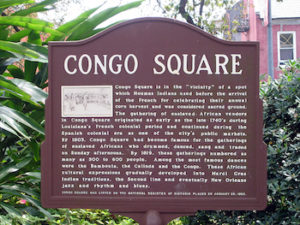
Congo Square is celebrated on this date's Registry in 1817. It is the informal name for an open area in the southern corner of Louis Armstrong Memorial Park in New Orleans, Louisiana.
Officially named Beauregard Square and Congo Plains, the site is paved with cobblestones and has large oaks and ornamentals. The site has remained an open meeting area since the city's establishment in 1718. Before 1800, Black slaves gathered on Sunday afternoons in this open field outside the city walls on the edge of the Treme plantation. Enslaved and free Blacks used this space to market goods, socialize, and participate in drumming, music-making, and dance.
These people helped maintain the African community's musical heritage and social cohesion. In 1817, the City Council of New Orleans passed legislation allowing African slave meetings. These meetings would occur in a designated public location chosen by the mayor, Congo Square.
The primary instrument for the cultural music expression was a long, narrow African drum. It came in sizes from three to eight feet long and had previously been banned in the South by whites. Other instruments used were the triangle, a jawbone, and early forerunners to the banjo. Many dances were performed in Congo Square, including the “Flat-Footed-Shuffle” and the” Bamboula.”
The locals and a growing list of visitors to the city also went there to listen to Black music and dance. One of the most reasonable explanations for the spiritual symmetry between West Africa and the city of New Orleans at that time was that it was a Catholic colony. Catholicism’s acceptance of a variety of saints and spirits was a major factor in the religion’s ability to both embrace and assimilate African spirituality. Bruce Raeburn, the curator of the Hogan Jazz Archive at Tulane University, says, "There is greater ease that is made possible between African religions and Catholicism. The iconography of the Catholic faith is not stark, but rather, it’s loud and, in its own way, colorful. It lends itself to the kinds of additions that we find in African spirituality."
So, a less restricted attitude towards other religions than existed in New Orleans allowed for African retention. The music and its inherent spirituality, developed out of Congo Square, exemplified this. Congo Square represents an Africanized approach to music and culture. As time went by, the music of New Orleans spread throughout the country because of the travels of such early jazz musicians as Louis Armstrong, Sydney Bechet, Jelly Roll Morton, Mahaila Jackson, and others. The music continued to thrive in New Orleans, permeating every aspect of people’s lives in Crescent City. The use of this area declined in the 1840s and ended by the beginning of the American Civil War.
Today, Congo Square holds special symbolic importance to African Americans. It is significant because of the square's role in New Orleans' musical heritage and as a symbol of the early African contributions to the origins of jazz and other American musical forms. In the 21st century, standing in tribute to the accomplishments of the tightly knit New Orleans musical community, Congo Square remains a memorial to the artists who transformed their sound and exported it worldwide. Congo Square was recently listed on the National Register of Historic Places.
Armstrong Park is handsome, elegant, and dignified near Canal Street in downtown New Orleans. Like much of the current cityscape, it was submerged beneath the waters from Hurricane Katrina. But grim as that episode was, the loss of life, property, and community will not drown New Orleans' richness as a roux musical tradition. Congo Square and the music were not lost in the flood.
The Washington Times
3600 New York Ave NE
Washington, DC 20002-1947,
Image by Carly Rosenberg